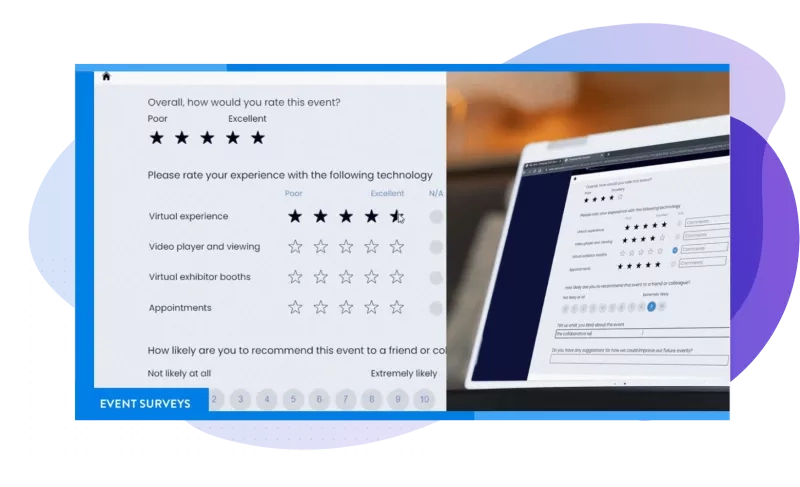
Have you ever sat down to create a survey and realized every word you use matters? Seriously, your words, question order, and answers shape how each person takes that survey. If you don't pick carefully, you could create either a biased or meaningless survey. The worst thing you could do is create a survey from which you can't even use the results.
What Is a Survey Question?
Event survey questions are used to gather data about respondents' attitudes, behaviors, opinions, or experiences. This feedback is collected to conduct research, and the information received can be used to inform decision-making.
Types of Survey Questions
The best way to start your survey is to understand each part of it. The most important part is formulating and choosing your questions.
For starters, there are five main types of survey questions. Keep in mind that each type of question collects a different type of data, and while many survey questions are closed-ended, you can also leverage open-ended questions to great effect.
1. Open-Ended Questions
This type of question is used to gain more insight into how the respondent feels. These require much attention, so only use them when it makes sense.
Open-ended questions are helpful because the respondent's answer is not based on the researcher's assumptions. Instead, it's a personalized answer every time. These questions are more time-consuming to analyze but provide deep feedback.
Remember, when crafting open-ended questions, you want to be as specific as possible to guide respondents' answers and ensure responses are detailed and useful to your research.
Example:
"What could we have added to our event to make it more enticing?"
2. Multiple-Choice Questions
This question type is often used to gather demographic information or find out about various issues. Multiple-choice questions can require a single answer or offer multiple answer selections.
Use these to group people based on what you already know. For instance, if only five color choices are available for event promotional materials and you are polling your attendees on their favorite color, only list the five options available.
Example:
What is your marital status? (Select one)
- Single
- Living with Partner
- Married
- Divorced
- Separated
- Widowed
3. Ordinal Scale Questions
This question type asks respondents to rank a range of items or choose from an ordered set. This is helpful when you want to determine the importance of each criterion. Make sure to identify your number scale (1 being the first choice and 5 being the last choice, etc.).
Example:
When considering a job offer, please rank the importance of the following (Please fill in your rank order using numbers 1 through 5, with 1 being the most important):
- Positive working environment
- Salary
- Benefits
- Vacation time
- Challenging workload
4. Interval Scale Questions
This is the most commonly used question type. On an interval scale, it is important that the space between each option, whether it’s a number range or a feeling range, are equal. You have probably seen scales asking about agreement strength, likelihood, or satisfaction (i.e., very unsatisfied, unsatisfied, neither satisfied nor unsatisfied, satisfied, very satisfied).
Use these questions when you want to gauge the opinion of your respondents. How do they feel when it's measured out in front of them?
Example:
Please rate the quality of this event.
Very Poor | Poor | Satisfactory | Good | Excellent
5. Ratio Scale Questions
This question type asks respondents to answer in a measurable way. You’ve likely seen ratio scale questions about income, age, or hours spent. Ratio scale questions have a true zero and oftentimes will be presented in an ordinal way with ranges. However, these ranges can still be treated as ratio responses for analysis.
Example:
How many hours a day do you spend on a computer?
0-2 hours | 2-4 hours | 4-6 hours | more than 6 hours
Selecting the correct question type is an essential part of any survey design. Carefully consider the question type(s) in your next survey in order to obtain significant data.
Bonus Types of Survey Questions
Beyond these types of survey questions, there are a couple more you can put into practice to gain insights about your audience. These include:
Yes/No or True/False Questions
Perhaps the simplest survey questions offer only two options: Yes/No or True/False. While these questions can produce responses that are easy to analyze, they don't allow for much gray area. It's important to use these limited-answer questions sparingly and only in instances where respondents should feel there's a clear answer—there should be no possibility of subjective answers or opinions confusing respondents.
Example:
Did your company pay for your eating expenses while you attended this event?
Yes | No
Net Promoter Score (NPS) Questions
NPS questions measure customer loyalty by asking respondents to rate, generally on a scale of 0 to 10, how likely they are to recommend a product, service, or organization to others. These questions help assess customer satisfaction and brand advocacy. Coupled with more extensive survey questions, an NPS question can help organizations understand where they might have room to grow and in what ways they are already satisfying their customers.
Example:
What Are Examples of Survey Questions?
Want a little more help formulating your survey questions? Take a look at these examples of survey questions, and consider how you might leverage the different question types to get the information you're looking for.
Open-Ended Question Examples
- What made you choose to attend our event?
- What is one thing you would change about this year's event?
- What are two ways we could improve accessibility at our event?
Multiple-Choice Question Examples
1. Where would you like us to hold next year's event?
- Las Vegas
- Orlando
- Chicago
2. How did you hear about our event?
- Social Media
- Word of mouth
- Your company
- Other (please specify)
Ordinal Scale Question Examples
1. When deciding to attend our event, please rank the importance of the following (Please fill in your rank order using numbers 1 through 5, with 1 being the most important):
- Networking opportunities
- Session topics and speakers
- Career growth / educational opportunities
- Travel budget
- Location appeal / "bleisure" opportunities
2. When promoting your events, please rank the following tactics in order of effectiveness (1 through 5, with 1 being the most effective):
- X (Formerly Twitter)
- Direct Email
- Webinars
Interval Scale Question Examples
1. How strongly do you agree with this statement? "I am satisfied with the session content and speakers at this year's event."
- Strongly agree
- Agree
- Neutral
- Disagree
- Strongly disagree
2. How strongly do you agree with this statement? "This event was worth the cost of attending."
- Strongly agree
- Agree
- Neutral
- Disagree
- Strongly disagree
Ratio Scale Question Examples
1. How many months in advance do you typically begin planning your events?
- 0-2 months
- 3-6 months
- 7-9 months
- 10-12 months
- More than 1 year in advance
2. In the past 12 months, how many events have you attended through your company?
- 0-2
- 3-5
- 6-10
- More than 10 events
Yes/No and True/False Question Examples
1. Did you drink coffee during this event?
- Yes
- No
2. True or false: This event was intended primarily for B2B marketing professionals.
- True
- False
In this scenario, you might be gauging how well you spoke to your audience and whether they understood your intentions for your event.
Net Promoter Score (NPS) Question Examples
1. On a scale of 1 to 10, how likely are you to recommend our webinar product to a friend or colleague?
0—1—2—3—4—5—6—7—8—9—10
2. On a scale of 1 to 10, how likely are you to recommend our customer support bot to a friend or colleague?
0—1—2—3—4—5—6—7—8—9—10
Benefits of Using Surveys to Collect Feedback
Surveys are an invaluable piece of the marketing puzzle. From understanding customer sentiment to strategizing ways to improve an event, the uses of survey data are endless. Let's take a look at just a few of the benefits of using surveys to collect feedback.
1. Cost-Effective Feedback
Surveys offer a cost-effective method of collecting feedback and turning that into actionable data. Compared to other market research techniques, such as focus groups or interviews, surveys are more efficient in terms of cost, as they can be distributed online and targeted to achieve maximum participation without travel, staffing, or printed distribution.
2. Time-Efficient
Surveys can reach a large number of respondents simultaneously in an instant, allowing for quick data collection. Automated survey tools further streamline the process by eliminating manual data entry.
3. Quantifiable, Comparable Data
While other forms of market research can produce long-form, anecdotal feedback that's highly valuable in its own rite, surveys provide measurable data that can be analyzed, compared to other data sets, and used to draw quantified conclusions. This allows for easy tracking of trends and patterns over time.
4. Anonymity and Confidentiality
Surveys offer respondents the option to provide feedback anonymously, which can encourage honest and unbiased responses that translate to more accurate data.
5. Wide Reach
Surveys can be distributed to a broad, widespread audience, regardless of their geographic location. This allows businesses to collect feedback from diverse customer segments or target markets.
6. Flexibility in Question Types
As we've demonstrated, there are a number of survey question types, which means you can achieve a combination of quantitative and qualitative data collection across multiple topics as is helpful to your research.
7. Customization
Surveys can be tailored to specific objectives and target audience segments, allowing organizations to ask highly relevant and personalized questions, ensuring the collected data meets their needs.
8. Real-Time Insights
With online survey tools, organizations can collect and analyze data in real time, allowing them to quickly identify trends, make informed decisions, and respond promptly to customer feedback.
9. Benchmarking and Comparisons
Survey data can provide excellent benchmarks to help organizations measure their performance against industry standards or competitors. By comparing their results to external benchmarks, they can identify areas for improvement and stay competitive.
10. Customer Engagement
Organizations can never have too many opportunities to engage their customers, and surveys are exactly that—a platform for engagement. In addition to simply getting your customers to engage with your brand, you're also showing them that their opinions are valued and that you'll use their insights to inform future decision-making. This approach can enhance customer satisfaction and ultimately drive business growth.
For more on surveys, check out the Cvent Survey Platform.






